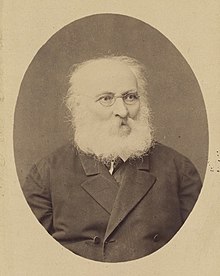Abraham Bear Gottlober
Abraham Bär Gottlober (also: Abraham Baer Gottlober or Abraham Ber Gottlober ; pseudonyms: Mahalalel , ABaG ; * December 20, 1810 in Starakonstantinow , Volhynia governorate , as the son of the cantor Chaim Hakohen; † April 12, 1899 in Białystok ) was a Hebrew and Yiddish poet (poetry and satires), journalist, enlightener, translator and Jewish scholar.
Life
After studying the Bible and Talmud , he married early, but had to part with his strictly religious wife because he could not suppress his interest in secular studies. In order to escape the forced recruitment into the tsarist army, he fled to Galicia, where he joined circles of the Haskala (here he met Josef Perl , among others ) and continued his studies. He graduated from a rabbinical school and from 1851 had been a Hebrew teacher at various religious schools for several years and led a wandering life full of privation.
From 1866 he was a lecturer in Talmud at the Zhitomir Rabbinical Seminary in Zhitomir , until it closed its doors in 1873, after which he moved to Dubno and devoted himself entirely to his literary inclinations. There he later founded the Hebrew journal Haboker Or (“Das Morgenlicht”, published 1876–1886, albeit with major interruptions), in which he was anti-assimilatory against the national Jewish -Zionist, religiously more traditional rite, edited by Perez Smolenskin in Vienna and thus the seemingly anti-Enlightenment monthly Haschachar appeared and defended the Mendelssohn school and its alleged achievements, opposed the Hasidic influence in the Jewish communities, against the old school system of the cheder , etc. and instead propagated a religiously independent Jewish school like them Max Lilienthal tried to establish it with the consent of the Russian government (during his active time as a teacher, AB Gottlober had also taught according to these guidelines; his students included Abraham Goldfaden and Mendele Moicher Sforim ).
AB Gottlober was committed to a religious reform and was more inclined to philosophy and, in particular, the study of Karaism , whose communities he visited ( Odessa and others) and there dealed with various followers of Karaism, their customs and views, their manuscripts, rituals, etc. studied; He presented the result of these investigations and considerations in 1865 in a larger Hebrew work published in Vilnius under the title Bikkoreth le toldoth hakraim ("Investigations into the history of the Karaites").
AB Gottlober spent the last years of his life, blind and completely withdrawn, in Białystok.
He also wrote a large number of Yiddish folk songs, which were widely published in magazines and various compilations and were very popular and sung later in the ghettos.
Works (selection)
- Pirche ha awiw (Spring blossoms. Collection of Hebrew poems), Josefow 1835
- Hanizanim (Buds. Collected Poems and Epigrams), Wilna 1850
- Anaph etz Awoth (myrtle wreath. Poems about the death of Emperor Nikolai I and about the peace government of Emperor Alexander II), Wilna 1858
- Mimizraim (From Egypt. Translation of Ludwig A. Frankl's travelogues into Hebrew), Vienna 1862
- Das Lied vom Kiegel (parody of Schiller's bell), Odessa 1863
- Jerusalem or about religious power and Judaism, by Moses Mendelssohn, translated into Hebrew by AB Gottlober , Shitomir 1867
- Toldoth hakkabbalah wehachasiduth (History of the origin and spread of Kabbalah and Hasidism), Zhitomir 1869
- Nathan hechacham (translation of Lessing's Nathan the Wise; translation in the meter of the original including a Lessing biography), Vienna 1874
- Kolrinah wi jschuah (Historical Novella from the Life of Russian Jews), Vienna 1875
- The Dektuch or two chupes in one night (The Baldachin or two weddings in one night), comedy in three acts, Warsaw 1876 (published anonymously; this work, taking into account its own bitter experiences, satirically opposed to the practice of child marriages judging, which the parents only wanted to know about the provenance of the marriage candidates when they closed, he had already completed it in 1838 and now, almost 40 years later, dared to publish)
- Peri kajiz (Scholia on the Last Prophets and Hagiographs), 1876–1879
- Hagisra wehabinja (AB Gottlober's memoirs, published in Haboker Or 1878/1879)
- Hisaharu biwne anijim (Take care of the children of the poor), 1879
- Sichronoth mime ne'uraj (autobiography), Warsaw 1880/1881
- Orot me'ofel (Lights from the Dark), 1881
- The Gilgul , 1896 (satirically thematizing the transmigration of souls; published again in 1871 in the journal Qol Mewasser , which was so important for the development of Yiddish literature )
- Kol'schire Mahalalel (Gottlober's poems, in three parts), Warsaw 1900
- Tipheret li Bene Binah (allegorical drama), without a year
- However, his memoirs on jargon writers, which appeared in the Jewish People's Library , are also considered to be the main work
literature
- A. Friedkin: Abraham Ber Gottlober and his epoch. Vilnius 1925
Web links
| personal data | |
|---|---|
| SURNAME | God Lover, Abraham Bear |
| ALTERNATIVE NAMES | Gottlober, Abraham Ber; Mahalalel (pseudonym) |
| BRIEF DESCRIPTION | Yiddish writer |
| DATE OF BIRTH | December 20, 1810 |
| PLACE OF BIRTH | Starakonstantinov |
| DATE OF DEATH | April 12, 1899 |
| Place of death | Białystok |
